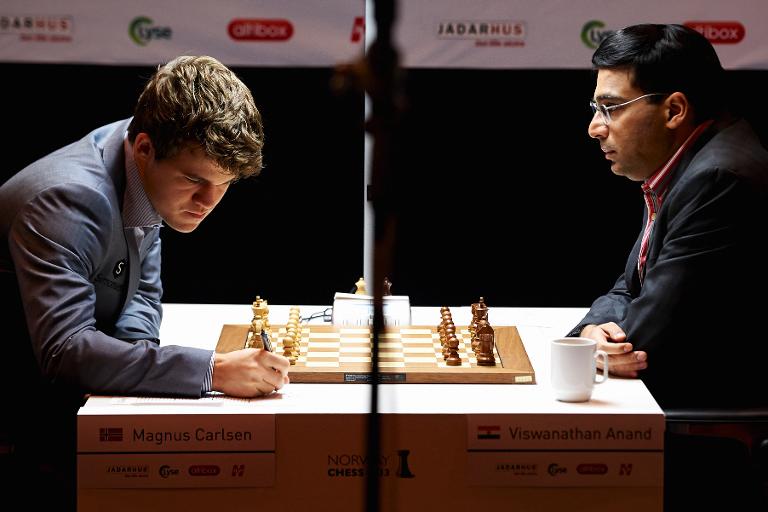A total of twelve matches were scheduled as part of the competition for the title. With the first four games ending with no result, much of the pressure was on both side to win the consecutive games to have a good chance of winning the title. However, Magnus Carlsen proved to be better than Anand and tasted his first victory in the fifth game. He also went ahead to win the next one as well. Pressure mounted on Viswanathan Anand to win the following games to retain the title. But the tide was in favour of Carlsen and all that Anand could manage was a draw in the next two matches in addition to the last game. Carlsen sealed his title with a win in the ninth game, by when it was clear that Anand was out of contention. The final tally read 6.5-3.5 in Carlsen’s favour making him the world champion.
End of Anand era ?
Viswanathan Anand is considered to be the first name of chess in India. He shot to fame in his teens by becoming a chess Master at the age of 15. At the age of 18 he was awarded with Padma Shri, a civilian honour, making him the youngest ever recipient. He won his first championship title in 2000 and had held it till 2013. He became the first Indian to win the title. He had also held the top position in the FIDE rankings for more than 15 months and was declared the undisputed world champion from 2007-2013. He is considered to be the strongest ever of his generation to play the ‘blitz chess’. With Anand’s defeat many experts claim this to be the end of Anand’s era of dominating the game.
Huge fan following
Though chess is not a fast moving game, this championship battle attracted a huge fan base. Many fans even from other countries thronged in Chennai to witness the two Grandmasters battling it out for the title. Many chess tournaments within the domestic circles were also conducted sidelining the Championship games. Many sections of the media were busy with feature stories about budding and promising chess players in the city and in various other parts of the city. The closing ceremony was held on November 25 during which Carlsen was awarded the prize money of Rs. 9.9 crores (approx 11.6 million euros) apart from the trophy while Viswanathan Anand was awarded with Rs. 6.03 crores (approx 710,000 euros). The prizes were given away by the Chief Minister of Tamil Nadu, Jayalalitha since the Government of Tamil Nadu was the principle sponsor of this championship.
Indian connection to chess
India has a long standing history of chess. It is believed that this game originated in 6th century A.D., and gradually spread to the west through Persia. The game was called Chaturanga which means four limbs in Sanskrit. These four limbs indicated the four divisions of military, namely, infantry, cavalry, elephant and chariot. Traditional Indian chess mostly had the conventional size of 8x8 though there were 9x9 and 10x10 versions as well. Compared with the present form of chess the traditional one had a few differences; the most notable one is that, the present day’s queen was called Mantri, which means Minister.
The game of chaturanga was a battle simulation game and indicated the Indian military strategy of that time. The Sanskrit name for this game is said to have originated from the Indian epic Mahabharatha where Chaturanga was a battle in the Great War. A notable Islamic scholar Abu al-Hasan Ali ibn al-Husayn al-Mas'udi who lived between 896 and 956 A.D., asserted that earlier in those days chess pieces in India were made of Ivory. The earlier form of chess seems to have originated from the famous Gupta dynasty. However, historians Gerhard Josten and Isaak Lender claim to have traced the origins of chess to the Kushan Dynasty in Ancient Afghanistan.
The game of chaturanga was a battle simulation game and indicated the Indian military strategy of that time. The Sanskrit name for this game is said to have originated from the Indian epic Mahabharatha where Chaturanga was a battle in the Great War. A notable Islamic scholar Abu al-Hasan Ali ibn al-Husayn al-Mas'udi who lived between 896 and 956 A.D., asserted that earlier in those days chess pieces in India were made of Ivory. The earlier form of chess seems to have originated from the famous Gupta dynasty. However, historians Gerhard Josten and Isaak Lender claim to have traced the origins of chess to the Kushan Dynasty in Ancient Afghanistan.
Future of chess in India
Viswanathan Anand greatly influenced the younger generation in India to pursue chess at a competitive level. The result, many Indian children are now mastering the game in their tender ages. Many schools have admitted students based on their skills over the game and help them excel. All these would not be possible had it not been for that 14 year old prodigy who won the National level tournament with a perfect score of 9/9.






























